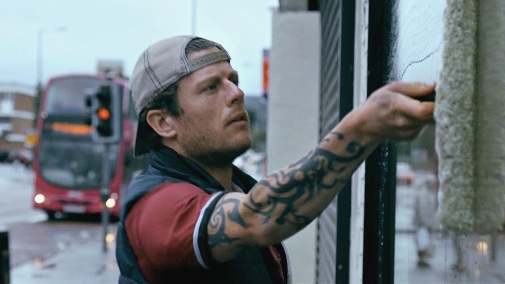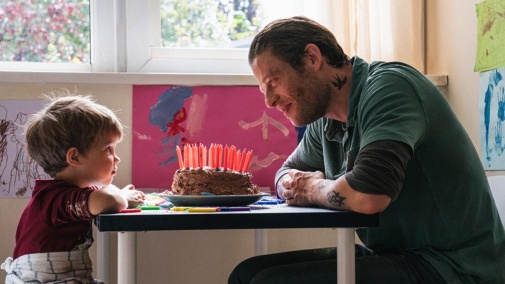Review: "Nowhere Special" finds hope in desolation
 Friday, April 26, 2024 at 8:00PM
Friday, April 26, 2024 at 8:00PM 
Windows can be like prosceniums, framing lives in tableaus practically begging to be spied upon. As one roams through the streets, one can peer into countless little dramas, comedies and farces. It's all there, the vitality of existence through a thin pane of glass. Uberto Pasolini's Nowhere Special starts with windows, a parade of frames and reflections captured by Romanian cinematographer Marius Panduru – you might be familiar with his work in Radu Jude's films. It's a beautiful prelude, bursting with quiet curiosity, as if the camera is considering which story it'll follow. However, this particular tale isn't to be found within, but without. It's the experience of the man who keeps those proscenium portals crystal clear.
He's John, a single father earning a living as a window cleaner. He's also dying…
Despite its Italian writer-director and Romanian DP, Nowhere Special is set in Northern Ireland, sitting comfortably in the social realist tradition of UK cinema. We're in kitchen sink territory, alright, though the uninformed viewer might not be immediately aware of what's happening in John's life. Rather than spoon-feeding his audience, Pasolini repudiates exposition and prefers to play a game of inference. He lets the film reveal its secrets by whatever the taciturn protagonist chooses to disclose, aligning itself with his perspective, basic structure included. John is the one defining our access to his story, a shred of control he can retain as everything else slips away.
Well, that's only half true. After all, Nowhere Special finds him interviewing a series of different households, prospective families that will take care of his three-year-old son when John succumbs to a terminal illness. It's a strange process, even for the social workers setting it up. They aren't anonymized by their function within the narrative and system, mind you. Instead, they're fully-fledged people. The camera is generous and so is the script, catching glimpses of humanity wherever it can, the unlikeliest places and fraught circumstance. And you better believe that every parental audition brings with it a different discomfort.
These are opportunities for John to do like Pasolini's gaze and peek into the window of other people's private worlds, judging, comparing himself up to his child's eventual caretakers and measuring what kind of future little Michael will have in store. Class divides soon manifest, tensions unspoken and only ever implied. Such issues follow John into the remnants of his professional life, for there's a keen awareness that the moment he stops being able to provide, he'll be obsolete – a burden, perchance a danger to the boy. In the system we live in, people's value is often reduced to their money-making ability, their function as cogs in the machine, sources of material means.
If you're not productive, you're nothing, especially as time runs out and the chance to secure stability crumbles into dust.

It's an agonizing scenario, enough to make you scream in outrage and sympathy, voicing what the protagonist conspicuously avoids doing. Only outside the scheduled visits does Pasolini let John express a modicum of outrage, whether directed at a rude client or the injustice of his ailment. For the most part, he keeps to himself, near the point of self-effacement. When one of the families inquires about what they should tell Michael about his father, the only thing John offers is, "Say I washed windows." On other occasions, he bristles at leaving behind a box of personal artifacts for his son to have when he's older. Why should he?
John is already resigning himself to the fate of being forgotten. He's a dead man walking, behaving like a ghost, though his decaying body still has some life left. James Norton is subtly sublime at articulating these thoughts, painful ideas as far as the eye can see. Physically, he often moves with the pondered slowness of someone for whom every gesture is a struggle. It's not an overstated bit of actorly business but a lived-in reality, that of a dying body holding on to normalcy while he can. It makes occasions like a supermarket sprint before Michael's birthday much more significant.
On an innate level, the viewer knows how much the exuberance costs. Simultaneously, it's evident why he makes the sacrifice. In this and other ways, Nowhere Special isn't so much a tale of death as a poem on fatherhood. Fittingly, some of the film's best passages focus on the quotidian of father and son, sharing their space, negotiating affection at a breaking point, and so on. Though he might not know what's happening, Michael must feel his father's distress, reacting in little ways that feel earth-shattering the more we familiarize ourselves with the characters and their idyosincrasies.
A little interlude on the sofa with a cup of water is so lovely that words fail me. The same could be said about Michael's attachment to a toy lorry or how, in another scene, a red balloon lost to the heavens strikes a devastating note. The latter is breathtakingly beautiful in its emotional economy.
Please be aware that this picture's basic premise could be pornographically maudlin in less gentle hands. It's a miracle how the artists involved escape the downfalls of cheap sentiment, whether by virtue of the cast – James Norton the first among equals – or Pasolini's lensing, his penchant for low-key observation with little in the way of dramatic forcefulness. Moreover, by avoiding the expected conclusions and stopping short of John's demise, Nowhere Special preserves the character's dignity. It's a generous gesture, emblematic of a Humanism that confronts downtrodden existences without defining them through suffering alone.
Turning its face away from darkness, Nowhere Special provides a sliver of hope at the end of one's life. I hope that, when you're gone, your loved ones will be cared for. That they'll be happy in your absence. Some may regard such notions with despondence, but Nowhere Special seeks to see them as the ultimate testament to John's resilient valor. So, dry those tears the film so rightfully earned and bask in the warmth of a father's love—no need to wallow in misery.

Nowehere Special is currently enjoying a limited theatrical release, distributed by the Cohen Media Group.



Reader Comments (4)
What?! I saw this at home during the pandemic (legally, of course).
Beautiful movie. Just beautiful.
Peggy Sue -- This film had its world premiere in 2020, and was commercially released in many countries around 2021. Weirdly enough, it's only now receiving a theatrical release in the US.
nice content thanks for sharing
nice content thanks for sharing